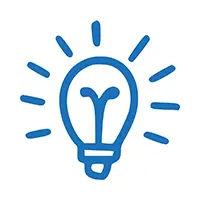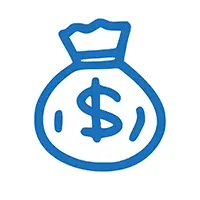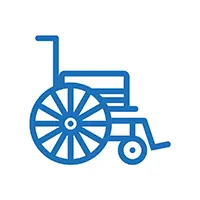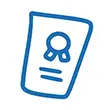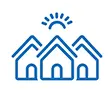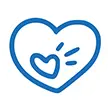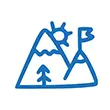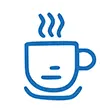Video details
Video title: A vision loss adventure (Part 1)
Video duration: 6:20
Page(s) this video appears on:
Video transcript
[Music playing]
[Music volume fades to background level]
Julie: Hi, I'm That Blind Woman, Julie Woods, from Dunedin. I suppose the most pivotal lesson I have learnt is, learning to say why not to opportunities that come my way. When I had been blind for a couple of years, I was out at the Blind Foundation and the recreation advisor came up to me… and she said to me, Julie we're taking a group of blind people away cross-country skiing. Would you like to come? And I thought cross country skiing? Sounds really dangerous. Might fall over, something might happen to me. And I politely declined. And I went home and I sat on the safety of my couch… that night. And I thought, you stupid woman. What kind of blind person are you going to make if you turn down opportunities that come your way?
[Music volume rises]
Julie’s eye sight started deteriorating at age 18. By age 42, a single mum raising two boys, she was totally blind.
[Music fades out]
Julie: So I decided at that moment rather than to say no, I would say why not? And I've said why not to… walking 10 half marathons, um, visiting the seven wonders of the world, learning to read with my fingers, going up in a hot air balloon, going down the shotover river in the jet… doing all those things that I thought that I couldn't, so I think I'd like other people to understand that, 'no', is the biggest barrier to you living the life that you want to live.
[Music playing]
Since becoming blind, Julie has travelled to 50 countries, and has been to all seven wonders of the world.
[Music volume fades to background level]
Julie: People would say to me, how can you sightsee when you can't see? And I would say, because I can smell, hear, taste and touch, and every day I'm away I write a blindfulness diary, one thing that I smell, hear, taste and touch.
[Music volume rises]
[Music volume fades to background level]
Julie: Pocket on the outside…Would you like some toast?
[Music fades out]
Julie: People assume that I can't cook, that I can't choose my clothes, that I can't put on my makeup, that I can't operate a computer, that I can't operate a cell phone. So many things.
Julie: So cooking without looking is all about what you smell, hear, taste and touch, so… I can't see the bread and where it is in the freezer so I have to have a system that says it's always down the bottom and on the left hand side and then I can go to it straight away and feel it with my fingers, so I can feel the toaster cooking. I can smell the toast cooking. I can find the margarine in the fridge 'cause it's always put back in the same place so things have to be returned to the same place and… I use those other senses to identify what I'm… finding, using.
Julie: Right, so the washing is on the rooftop [lift door opening].
Julie: I think what the world needs to do with blind people is to raise their expectations… because what I find is that people have very low expectations of what a blind person can and can't do, so to raise the bar in your own thinking about what a blind person can do, rather than focusing on what they can't do, and that involves creating accessible… an accessible world where I'm not being sent print letters by government departments, or… that I have tactile warning indicators and audible signals at traffic lights, all those things that not only help me as a blind person but actually help the greater world as well.
Julie: So going blind has made me realise that the biggest thing about being a human being is connection. And, I don't know if you can see on my t-shirt I've got one million names in braille. [Music starts playing softly] That is a dream of mine to write the names of one million people in braille.
[Music volume rises]
[Music volume fades to background level]
Julie: I have written 7,448 names in braille. I've sent names to 24 countries around the world. I have written the name of New Zealand's oldest person, Madeline, who was 110 years old. I have written the names of triplets in China, who were my youngest babies when they were born, and I've written the name of Neve, Jacinda Ardern's baby, so our Prime Minister's baby. And I actually got a letter back from Jacinda Ardern in braille that she had signed, so by writing these names in braille, I'm deepening the connections that I have with people, ah not only here in New Zealand but also overseas and around the world.
Julie: So how long are you in Dunedin for, George?
George: ah… another, two hours
Julie: oh wow are you on the boat?
George: yup
Julie: cool
Julie: So there's your name - G-E-O-R-G-E. George. So you're now added to my total.
George: [Laughs] Thank you
[Music volume rises]
[Music volume fades to background level]
The biggest thing you can bring to change is an open mind… and that comes back to the 'why not' message, so… being open-minded to learning new things, stretching yourself and, to doing things in different ways, then it's amazing the kind of life that you can live.
[Music volume rises]
[Music plays outro]
Last updated on Thursday, 30 May 2019

